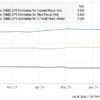
The Nasdaq Composite (NASDAQINDEX: ^IXIC) entered a bull market in December 2022. In the 18 months or so since, the technology-heavy index has advanced by 76% amid surging interest in artificial intelligence. But based on historical patterns, those gains are likely just the beginning.
Since 1990, the Nasdaq has returned an average of 215% during bull markets that had average durations of about 40 months. If the current bull market aligns precisely with the historical average, then the Nasdaq will climb by another 139% from its cyclical low during the next 22 months.
That does imply a somewhat unrealistic return of 61% annually. But investors still have good reason to believe the Nasdaq will soar over time. The index has risen by a total of 2,420% during the last two decades, or 11.3% annually. That period encompassed such a broad range of economic conditions that it’s reasonable for investors to expect similar returns in the future.
With that broad outlook in mind, Alphabet (NASDAQ: GOOGL) (NASDAQ: GOOG) and Roku (NASDAQ: ROKU) would be worthwhile investments to consider buying now.
1. Alphabet
Alphabet derives most of its revenues from digital advertising and cloud computing. Its Google subsidiary is the largest ad tech company in the world due to its ability to engage internet users and collect data. It owns six consumer-facing products and services that reach 2 billion monthly users each, among them Google Search, YouTube, Chrome, and Android. That reach and the insight it provides are valuable to advertisers. So much so that according to a forecast from Emarketer, Google will soak up 27.4% of digital advertising revenue worldwide in 2024.
Meanwhile, Google Cloud is the third-largest provider of cloud infrastructure and platform services. Google Cloud trails Amazon Web Services and Microsoft Azure by a wide margin in market share, but it did gain a percentage point over the past year, and that trend could continue as artificial intelligence (AI) and machine learning (ML) consume a greater portion of IT budgets.
Indeed, a recent CIO survey from Morgan Stanley predicted that Microsoft would be the cloud provider that will see the largest incremental share gain in AI/ML workloads over the next three years, but it forecast that Google would be the second-largest beneficiary in that space. Supporting that conclusion was the early success of multimodal model Gemini, designed to compete with the models that power ChatGPT. Google’s Gemini is currently the second most popular AI cloud service.
Alphabet showed financial strength in the first quarter, with growth accelerating on the top and bottom lines. Revenue rose 15% to $80.5 billion due to strong momentum in the Google Cloud segment, which also includes Google Workspace office productivity software. Meanwhile, GAAP net income soared 57% to $23.7 billion, a gain that was helped along by disciplined expense management.
Through 2027, Wall Street analysts estimate that Alphabet will grow earnings per share at an annualized rate of 16%. That forecast makes its current valuation of 28.2 times earnings seem reasonable. From that level, I think Alphabet has a good shot at outperforming the Nasdaq over the next three to five years.
2. Roku
Roku connects streaming content publishers and advertisers with consumers. It is the leading streaming video platform in the U.S. as measured by streaming hours, and its Roku OS is the best-selling TV operating system in the U.S. and Mexico. Approximately 40% of smart TVs sold in those nations during the first quarter were Roku TVs.
Additionally, it offers on-demand content and live television through The Roku Channel, an ad-supported streaming service that consistently ranks as one of the most popular channels on the platform. Indeed, The Roku Channel recently surpassed Peacock (owned by Comcast) and Max (owned by Warner Bros. Discovery) to become the seventh-most-popular streaming service in the U.S.
Roku reported encouraging financial results in the first quarter. Revenue rose 19% to $882 million, a sequential acceleration from 14% growth in Q4 2023. Meanwhile, adjusted EBITDA improved to $41 million, a big flip from its EBITDA loss of $69 million in the prior-year period. Investors have good reason to believe that the favorable momentum will continue.
Emarketer forecasts that U.S. connected TV ad spending will increase at an annualized rate of 13% through 2027. Roku is set to benefit from that growth due to its superior ability to engage viewers, as evidenced by its leadership position among streaming platforms and the growing popularity of The Roku Channel.
Roku also stands to benefit from its recently announced partnership with The Trade Desk, the largest independent ad tech platform for media buyers. Specifically, Roku will share data with advertisers using The Trade Desk to help them “better understand and optimize their campaigns for TV streaming viewers.” That should make Roku’s ad inventory even more compelling.
On average, Wall Street analysts expect Roku’s sales to increase by 12% annually through 2027. I think that estimate leaves room for upside surprises, given that the broader connected TV advertising market is forecast to grow even more quickly. However, even if Wall Street is correct, the stock still looks reasonably valued at its current price-to-sales ratio of 2.4, and Roku has a good shot at outperforming the Nasdaq over the next three to five years.
Should you invest $1,000 in Alphabet right now?
Before you buy stock in Alphabet, consider this:
The Motley Fool Stock Advisor analyst team just identified what they believe are the 10 best stocks for investors to buy now… and Alphabet wasn’t one of them. The 10 stocks that made the cut could produce monster returns in the coming years.
Consider when Nvidia made this list on April 15, 2005… if you invested $1,000 at the time of our recommendation, you’d have $751,670!*
Stock Advisor provides investors with an easy-to-follow blueprint for success, including guidance on building a portfolio, regular updates from analysts, and two new stock picks each month. The Stock Advisor service has more than quadrupled the return of S&P 500 since 2002*.
*Stock Advisor returns as of July 2, 2024
Suzanne Frey, an executive at Alphabet, is a member of The Motley Fool’s board of directors. John Mackey, former CEO of Whole Foods Market, an Amazon subsidiary, is a member of The Motley Fool’s board of directors. Trevor Jennewine has positions in Amazon, Roku, and The Trade Desk. The Motley Fool has positions in and recommends Alphabet, Amazon, Microsoft, Roku, The Trade Desk, and Warner Bros. Discovery. The Motley Fool recommends Comcast and recommends the following options: long January 2026 $395 calls on Microsoft and short January 2026 $405 calls on Microsoft. The Motley Fool has a disclosure policy.
History Says the Nasdaq Will Soar: 2 Remarkable Growth Stocks to Buy Now for the Bull Market was originally published by The Motley Fool
EMEA Tribune is not involved in this news article, it is taken from our partners and or from the News Agencies. Copyright and Credit go to the News Agencies, email news@emeatribune.com Follow our WhatsApp verified Channel





